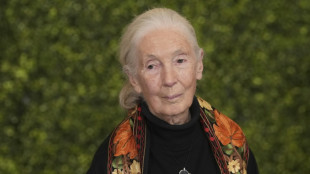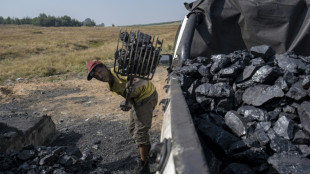
-
 Deja vu on the Moon: Private US spaceship again lands awkwardly
Deja vu on the Moon: Private US spaceship again lands awkwardly
-
Brazilian teen Fonseca into Indian Wells second round

-
 Abortion access under threat in Milei's Argentina
Abortion access under threat in Milei's Argentina
-
Trump backs off Mexico, Canada tariffs after market blowback

-
 Trump car tariff pivot and Detroit's 'Big Three'
Trump car tariff pivot and Detroit's 'Big Three'
-
Man Utd draw in Spain in Europa League last 16 as Spurs beaten

-
 California's Democratic governor says trans women in sports 'unfair'
California's Democratic governor says trans women in sports 'unfair'
-
Trump says Musk should use 'scalpel' not 'hatchet' in govt cuts

-
 Goodall, Shatner to receive environmentalist awards from Sierra Club
Goodall, Shatner to receive environmentalist awards from Sierra Club
-
Dingwall glad to be 'the glue' of England's back-line against Italy

-
 Chelsea edge Copenhagen in Conference League last 16 first leg
Chelsea edge Copenhagen in Conference League last 16 first leg
-
Real Sociedad fight back to earn Man United draw in Europa League

-
 Chunky canines: Study reveals dog obesity gene shared by humans
Chunky canines: Study reveals dog obesity gene shared by humans
-
Europe rallies behind Zelensky as US announces new talks with Kyiv

-
 Drop in US border crossings goes deeper than Trump
Drop in US border crossings goes deeper than Trump
-
Guyana appeals to UN court as Venezuelan plans vote in disputed zone

-
 Private US spaceship lands near Moon's south pole in uncertain condition
Private US spaceship lands near Moon's south pole in uncertain condition
-
Saudi PIF to pay 'up to 12 months maternity leave' for tennis players

-
 16 killed in 'most violent' Syria unrest since Assad ouster: monitor
16 killed in 'most violent' Syria unrest since Assad ouster: monitor
-
Peru farmer confident ahead of German court battle with energy giant

-
 US-Hamas talks complicate Gaza truce efforts: analysts
US-Hamas talks complicate Gaza truce efforts: analysts
-
European rocket successfully carries out first commercial mission

-
 SpaceX gears up for Starship launch as Musk controversy swirls
SpaceX gears up for Starship launch as Musk controversy swirls
-
Trump backs off Mexico tariffs while Canada tensions simmer

-
 Europe's new rocket blasts off on first commercial mission
Europe's new rocket blasts off on first commercial mission
-
SpaceX gearing up for Starship launch amid Musk controversy

-
 Racked by violence, Haiti faces 'humanitarian catastrophe': MSF
Racked by violence, Haiti faces 'humanitarian catastrophe': MSF
-
Gisele Pelicot's daughter says has filed sex abuse case against father

-
 New Zealand set for 'scrap' with India on slower pitch: Santner
New Zealand set for 'scrap' with India on slower pitch: Santner
-
US signals broader tariff reprieve for Canada, Mexico as trade gap grows

-
 US to carry out first firing squad execution since 2010
US to carry out first firing squad execution since 2010
-
Roy Ayers, godfather of neo-soul, dead at 84

-
 ECB chief warns of 'risks all over' as rates cut again
ECB chief warns of 'risks all over' as rates cut again
-
Albania to shut down TikTok in coming days

-
 Pompidou museum invites public for last look before renovation
Pompidou museum invites public for last look before renovation
-
Graham returns for Scotland's Six Nations match against Wales

-
 US firm hours away from Moon landing with drill, rovers, drone
US firm hours away from Moon landing with drill, rovers, drone
-
Bosnian Serb leader rejects prosecutor summons as crisis deepens

-
 England considering Test skipper Stokes for white-ball captaincy
England considering Test skipper Stokes for white-ball captaincy
-
Neymar back for Brazil after 16-month absence for World Cup qualifiers

-
 US trade gap hits new record in January as tariff fears loomed
US trade gap hits new record in January as tariff fears loomed
-
Scandinavians boycott US goods over Trump's Ukraine U-turn

-
 South Africa, Indonesia say US withdrawing from climate finance deal
South Africa, Indonesia say US withdrawing from climate finance deal
-
ECB lowers rates again but hints more cuts in doubt

-
 Bosnian Serb leader says he is no threat to Bosnia
Bosnian Serb leader says he is no threat to Bosnia
-
Wales unchanged for Scotland Six Nations clash

-
 World's sea ice cover hits record low in February
World's sea ice cover hits record low in February
-
Liverpool must be ready to 'suffer' in PSG return leg, says Van Dijk

-
 Lithuania quits treaty banning cluster bombs despite outrage
Lithuania quits treaty banning cluster bombs despite outrage
-
Philippines' Palawan approves 50-year ban on new mining permits


Myanmar's Suu Kyi: Prisoner of generals
Myanmar's latest democracy struggle enters its second year with its best-known figurehead Aung San Suu Kyi isolated from the fight, a prisoner of the generals behind the coup and facing the rest of her life in prison.
The Nobel laureate has been held since the putsch that ousted her government in the early hours of February 1 last year, ending a brief democratic interlude for the country and sparking huge protests.
Months before, her National League for Democracy (NLD) had swept national elections and she had been preparing to begin another five-year term as the nation's de facto leader.
The daughter of an independence hero, Suu Kyi spent nearly two decades enduring long stretches of house arrest under the former military regime.
She has been jailed by the current junta for six years after being found guilty of illegally importing and possessing walkie-talkies, flouting Covid rules and incitement against the military.
She will remain under house arrest as she battles a slew of other charges.
While Suu Kyi remains immensely popular in Myanmar, her legacy abroad was deeply tarnished by her government's handling of the Rohingya crisis.
There was global revulsion at a 2017 military crackdown that saw around 750,000 members of the stateless Rohingya minority flee burning villages to neighbouring Bangladesh.
And for many still fighting in Myanmar, the revolution must go further than the movement that Suu Kyi led decades ago, and permanently root out military dominance of the country's politics and economy.
- Daughter of a hero -
Suu Kyi was born on June 19, 1945 in Japanese-occupied Yangon during the final weeks of World War II.
Her father Aung San fought for and against both the British and the Japanese colonisers as he jostled to give his country the best shot at independence, achieved in 1948.
Suu Kyi spent most of her early years outside of Myanmar -- first in India, where her mother was an ambassador, and later at Oxford University, where she met her British husband.
After General Ne Win seized full power in 1962, he forced his brand of socialism on Myanmar, turning what was once Asia's rice bowl into one of the world's poorest and most isolated countries.
Suu Kyi's elevation to a democracy champion happened almost by accident when she returned home in 1988 to nurse her dying mother.
Soon afterwards, at least 3,000 people were killed when the military crushed protests against its authoritarian rule.
The bloodshed was the catalyst for Suu Kyi.
A charismatic orator, the then-43-year-old found herself in a leading role of a burgeoning democracy movement, delivering speeches to huge crowds as she led the NLD to a 1990 election victory.
The generals were not prepared to give up power, ignoring the result and confining Suu Kyi to her home in Yangon, where lived for 16 of the next 20 years.
She was awarded the Nobel Peace Prize while detained in 1991.
The junta offered to end her imprisonment at any time if she left the country for good but Suu Kyi refused.
That decision meant not seeing her husband before his death from cancer in 1999, and missing her two sons growing up.
- Troubled relationship -
The military eventually granted her freedom in 2010, just days after elections that her party boycotted but which brought a nominally civilian government to power.
She swept the next poll five years later, prompting jubilant celebrations by massive crowds across the country, and increased her party's majority in 2020.
But Suu Kyi's administration was beset with trouble and marked by an uneasy relationship with the military, which maintained a powerful political role.
The government and the military appeared in lockstep after the 2017 Rohingya crackdown, however.
Her office denied claims that fleeing refugees had suffered rape, extrajudicial killings and arson attacks on their homes by Myanmar troops.
Suu Kyi defended the army's conduct and even travelled to The Hague in December 2019 to rebut charges of genocide at the UN's top court.
Weeks later she was its prisoner again, facing the possibility of spending the rest of her life in detention.
O.Krause--BTB
